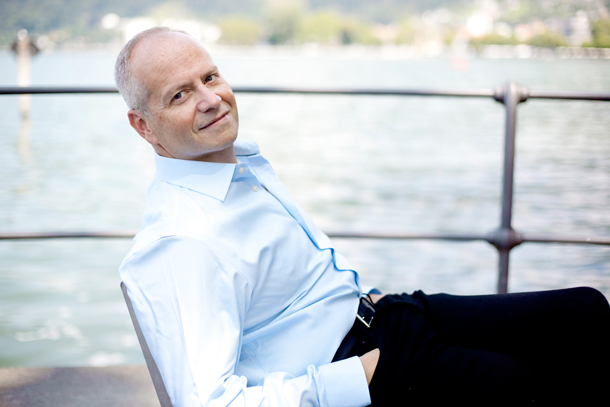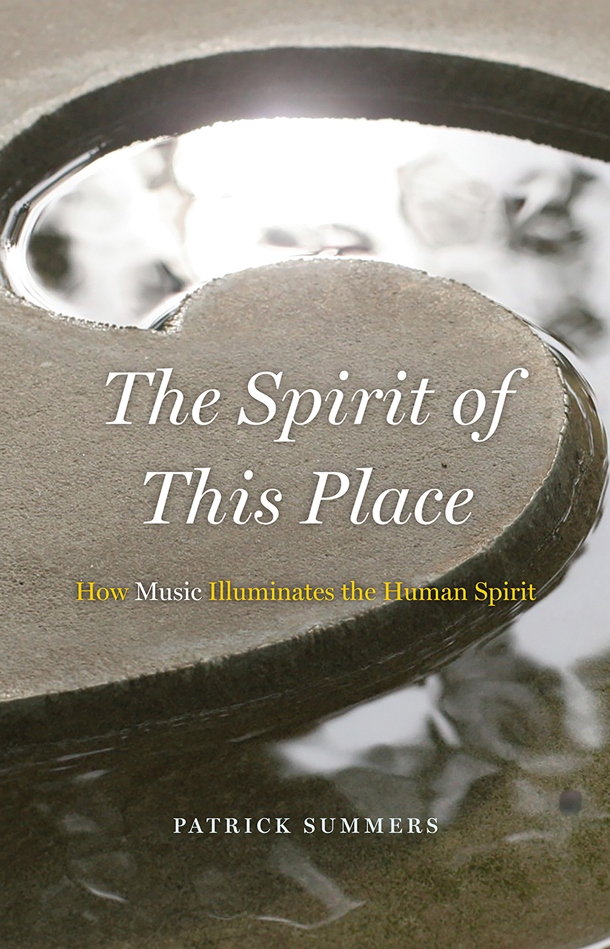
Musician of Note
HGO's Patrick Summers conducts a search in his new book 'The Spirit of This Place.'

Patrick Summers, Houston Grand Opera’s longtime artistic and music director, has chosen to wield a pen rather than a baton for his latest creative endeavor—a collection of essays entitled The Spirit of This Place: How Music Illuminates the Human Spirit, published by the venerable University of Chicago Press.
Early in the book, Summers promises to avoid “talking about everything,” but then, utilizing humor, experience, and a pithy self-awareness, proceeds to do just that. In the ensuing 155 pages, the author comments on everything from big-haired motorcycle cops and leaf blowers to country music and, of course, opera.
The book is composed of 37 vignettes drawn from lectures given at Houston’s Rice University, where Summers wandered about while wondering about music’s inescapable link to the human spirit.
Outside of music-making, writing is this maestro’s chosen method of communication. “There’s a certain amount of surprise that a musician would write at all,” Summers says. “I’ve kept a daily dairy since I was about 15 years old. For me, the process of writing is cleansing and ennobling—a spiritual act in itself. The book contains ideas that very much mirror my daily life as an artist.”

Contrary to people’s perception of an opera conductor, Summers has many other interests outside of the opera theater. “My life doesn’t have a single specific trajectory or a solitary goal that I’m working toward. In fact, quite the opposite. For me, an ‘artistic life’ is very much like a painting by the abstract expressionist Jackson Pollock: you throw some colors on the canvas and see if it looks like anything. If not, you throw on some more.
“Artists have ideas that they work on continuously. While I admire individuals like composer Richard Wagner, who discovered everything they were going to spend their life working on before they turned 30, I can’t do that. I’m too curious about the discovery of new ideas.”
Having led one of the world’s best opera companies for 20 years, ideas are this conductor’s currency. His book focuses on society’s transactional nature, which is anathema to all things artistic. One of the book’s revelatory claims is that opera, as an art, is a complete absurdity at any practical level.” Summers addresses the notion that his medium always seems to be on the verge of extinction, yet never quite succumbs to an impending Ice Age.
“At no time in the last 150 years has opera paid for itself—in any city, in any situation, ever,” Summers says. “This isn’t a new worry. In a transactional world, it’s difficult for people to comprehend that something that has to be subsidized can be spiritually fulfilling—and at the same time, unable to pay for itself. Even a sold-out performance at Houston Grand Opera covers only about 25 percent of the cost of raising the curtain on any given night.”
As expected, Summers spends a goodly portion of the book discussing the making of music. Interestingly, Grand Ole Opry star Porter Wagoner and opera’s most long-winded genius, composer Richard Wagner, elicit equal respect.
“When artists have a genuine connection to the words and music they are performing, integrity exists. You can feel the inevitable spirituality of their communication. Dolly Parton and Maria Callas each accomplish this in their own unique way.” Country music (described by Summers as “three chords and the truth”) or Mozart’s Così fan tutte can both achieve the same musical and spiritual result.
Having championed major new works, curated several of the world’s greatest voices, and shaped an opera company that exudes excellence (even when confronted with “Harvey-esque” levels of adversity), Summers is remarkably self-effacing. The book provides insight into the source of his somewhat understated (yet completely unwavering) enthusiasm.
“When you go into the pit to conduct, you have to be motivated by the fact that you will never be as good as the music is. No performance will equal the work itself –that’s the beautiful challenge. The process of ‘entering’ these [operatic] works and learning from them must always be a source of great joy.”
The “place” that Summers inhabits at HGO (when he’s not in the orchestra pit) is a fifth-floor office at Wortham Center—clearly his epicenter of “works in progress.” The score to HGO’s most recent world premiere, The Phoenix, sits on a table laden with future planning ideas. Amidst so much activity, how does this musician find the time to recharge his own artistic batteries?
“In an directorship position, everyone requires something slightly different from you. Conversely, you can’t ever give any one person everything they need. As a result, you have to be sure that you are refueling your own “supply,” artistically, so you can accomplish what you need to.
“I do that by writing, reading, practicing, and study. I connect to the natural world as much as I can. Additionally, [I’ve learned] that you have to obtain your ‘reward’ from the art itself; nothing else will provide that. Fame (or notoriety) is always about something you’ve done in the past. Being an artist focuses on what happens from the present moment forward. Take what you have learned—the joy and pain—and distill it for the benefit of younger artists.”
The operatic form demands an artist’s best effort. Audiences have become accustomed to near-perfect performances, and the latest theatrical technology makes flawless productions routinely possible. Confronting this technically demanding environment, Summers admits that it can be very difficult to maintain a spiritual relationship to music and art.He also provides little advice on how this relationship might be accomplished. In fact, Summers posits a contrary sentiment with the work’s most memorable sentence:
No one could, or should, tell anyone the spiritual meaning of anything.
“Works of art engage people where they are, at a point in time,” Summers says. “The journey is what’s most important. If some connection to art will let you notice the natural world in a non-transactional way, let it in.”
As you read The Spirit of This Place, it becomes apparent that “this place” is you.











Comments